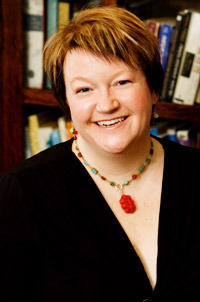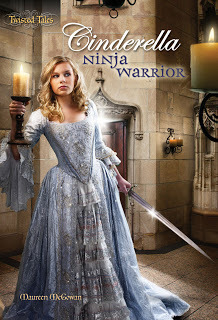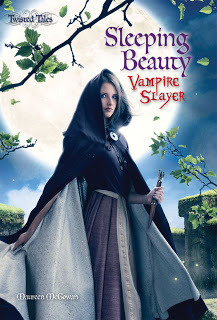Maureen McGowan's Doubly Twisted Launch + Giveaway!!
 I've had the pleasure of knowing the kind, talented and always wonderful Maureen McGowan for four years now, ever since we became '007 Bond Sisters. From the very first moment we met online, and through countless conversations (virtual and in person), Maureen has shown graciousness and generosity to every writer I've ever seen her interact with -- and to me personally -- over and over again.
I've had the pleasure of knowing the kind, talented and always wonderful Maureen McGowan for four years now, ever since we became '007 Bond Sisters. From the very first moment we met online, and through countless conversations (virtual and in person), Maureen has shown graciousness and generosity to every writer I've ever seen her interact with -- and to me personally -- over and over again. So, it is with great, throw-confetti-in-the-air excitement that I get to have her visit today, just a few days after the double release of her YA "Twisted Tales" books ~ Cinderella: Ninja Warrior and Sleeping Beauty: Vampire Slayer. Welcome, Maureen!!!
Can you tell us the premise of your book? (2 books, in your case!)
Both books are re-imaginings of the original fairy tales—keeping a few key story elements, but changing most and adding lots of fun and adventure. In Cinderella: Ninja Warrior, Cinderella is more than a servant girl waiting for her prince—she's a tough, fearless girl who is capable of taking charge of a dangerous situation. Seeking to escape the clutches of her evil stepmother, Cinderella perfects her ninja skills and magic talents in secret, waiting for the day when she can break free and live happily ever after. Cinderella has no intention of waiting around for a prince to save her.
In Sleeping Beauty: Vampire Slayer, Lucette (Sleeping Beauty), has been cursed to wake only at night, while everyone else in her kingdom has the opposite curse and falls asleep as she's waking each evening. Isolated from her family and friends at sixteen, she's the only one to defend the kingdom from vampires at night. Fighting evil vampires—and getting to know some good ones—she must find a way to break the spell before it's too late.
In both books, the reader can make choices at key points that affect how the story unfolds. (What a fabulous idea -- so cool and creative!!)
How closely do the books follow the original fairy tales?
One of my aims was to "fix" some of the story elements that bothered me in the traditional versions of these classic tales. Both of my stories have the tried and true fairy tale themes of finding true love and good triumphing over evil, but there are twists, too.
The traditional Cinderella character was too much of a victim for my taste, and I never liked the idea that the prince needed a shoe to recognize her the day after supposedly falling in love. Plus, he falls in love at first sight—presumably because of her beauty—but then doesn't recognize her the next day when she's out of her fancy dress? What kind of message does that send to modern young readers about love or their self-worth? (That's a great point. I know these changes you made are something I'm going to especially love about Cinderella: Ninja Warrior.)
Sleeping Beauty: Vampire Slayer probably has fewer similarities to the traditional tale. (There were no vampires in the original? An oversight, I'm sure.) When I first started the book, I thought it was about prejudice—humans' misconceptions about vampires and vice versa. But as soon as I started writing, it became more of a child of divorce story. Sleeping Beauty has to learn that her parents' and kingdom's problems aren't her fault—even if she's cursed. This theme popped out at me as soon as I started thinking about how parents might react if they knew their daughter carried a curse. And what it would feel like to grow up with this huge weight hanging over you.
But, although I think the stories do have positive messages for girls and an overall theme of empowerment, they are by no means "issue books". They're meant to be fun, fast-paced, exciting and most of all—entertaining.
 What drew you to writing YA after having written some terrific women's fiction stories? What is appealing about each genre?
What drew you to writing YA after having written some terrific women's fiction stories? What is appealing about each genre?
I still love women's fiction and enjoy, reading and writing in that genre, but I have to say, I wish I'd discovered the YA market sooner. I thought that YA books were "women's fiction light" or "romance light" or "paranormal light" and therefore figured writing for a younger age group wouldn't suit my voice, since I tend to love the darker, edgier aspects of most genres.
Then I discovered books like The Hunger Games and Forest of Hands and Teeth, to name just two, and soon realized that some of the edgiest, most daring, most imaginative storytelling was being produced by YA authors. I was hooked.
That said, the Twisted Tales series isn't that dark and edgy—closer to fun and silly—and they're suitable for readers as young as pre-teens, but the books don't pull punches, either. The villains are evil, really evil, and the heroines have to save themselves from some seriously dangerous situations. I think this is consistent with the way storytellers used to write for children, (say, when the traditional fairy tales were first told), but it seems to me as if, during the last century, the publishing industry started to coddle kids and as a result books for teen readers became somewhat marginalized. Most teens found them too childish and read adult fiction instead. (Disclaimer: This is just my impression.)
I love that the industry has re-discovered this book-loving age group and how so many of the most popular books right now were written for kids. Now the crossover is happening the other direction—with adults reading teen books—and I love it. Some of the very best books I've read in the past two years were written for teens. (I've read some excellent ones as well -- the genre has just blossomed, and I love how many choices there are out there for teen readers today.)
Do you have a favorite kind of food? Anything you really won't eat?
I love just about anything that's not good for me. As for things I won't eat… I haven't run into many, but do have a strong dislike for liver. **Shudders at the thought** (Agreed!! Bleh!)
Who was the first person you told when you got The Call announcing you'd sold your first novel?
I think I e-mailed my critique partners. In hindsight, I can't believe I didn't pick up the phone to call someone. It was a fairly surreal moment and not at all like I'd pictured it. The news actually came in an e-mail and I'm not sure I really believed it. Also, because neither book was written yet and I knew my deadlines would be tight, it was as terrifying as it was thrilling.
 What's your Writer Fantasy--i.e., to see your book make into a feature film, to be on the New York Times bestseller list for 40 consecutive weeks, etc.?
What's your Writer Fantasy--i.e., to see your book make into a feature film, to be on the New York Times bestseller list for 40 consecutive weeks, etc.?
Yes, yes, and yes. But realistically, it's just so fabulous to make things up for a living and have other people read and enjoy what I do. Can't beat that.
Would your high school friends be surprised to discover you'd become a novelist?
This is a good one! I think a few years ago I would have answered yes—they would be shocked—because my first career was in finance. But I've since run into a few people from high school and/or University who weren't shocked at all. One even said, "You finally figured out what you were supposed to do." It was gratifying to hear.
Do your neighbors/hometown acquaintances know you're a published author or did you just choose to tell those closest to you?
I always assumed that as soon as I sold a book I'd shout it out to anyone and everyone I ever met—even people I hadn't met. I also fantasized about things like going into bookstores and introducing myself to the manager, and sending out press releases, etc. In fact, during my first few years of taking writing seriously, I probably spent almost as much time learning about promotion and publicity as I did the craft of writing.
But it's odd. Now that I have actual books out I'm feeling shy about it. Sure, I'm talking about it on Facebook and Twitter and Blogs :), but as far as deliberately seeking out old friends to spread the word? Not so much. What's that about? I once attended a workshop given by Eloisa James who advised newly published authors to emulate Paris Hilton. Clearly I need to find and embrace my inner Paris. (LOL! No, I think you're terrific just the way you are. ;)
Maureen, thanks so much for being here and for offering to give away one of your new books (winner gets to choose which story) to one commenter on today's post!! The winner's name will be drawn randomly and posted on Friday. For more info on these books and, also, on Maureen's other writing, please check out her website and blogs: her personal one, Drunk Writer Talk and Get Lost in a Story. Good luck, everybody!
Published on April 05, 2011 05:17
No comments have been added yet.



